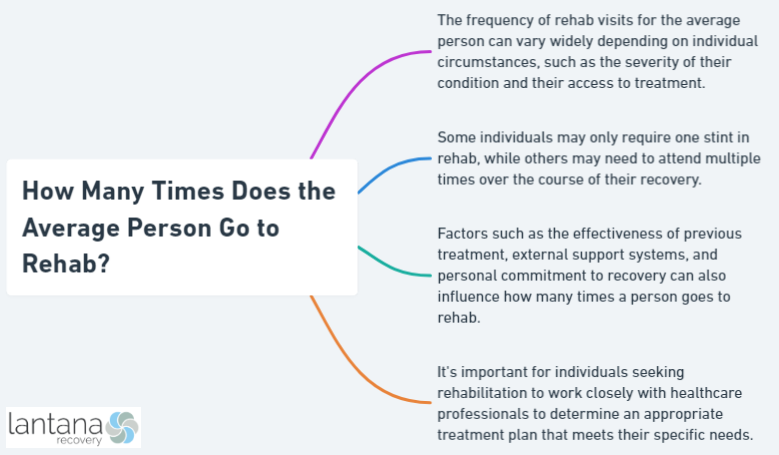How many times does the average person go to rehab?
While it may come as a surprise to many, patients suffering from drug abuse will often seek drug rehab more than once and this can be quite effective, especially if you are suffering from severe forms of addiction. Similarly, rehab is quite common during drug addiction treatment and to stay sober and free of substance abuse in the long run, it is important to equip yourself with the right coping skills and attitude to help you stay clean for good.
Since relapse is quite common during drug addiction, it is definitely not a sign of failure. Instead, it is a necessary step for drug addicts to train their body to fight through the withdrawal symptoms that often occur while staying sober. This is why most patients are recommended to enroll into outpatient programs or visit the rehab facility frequently to deal with any addiction issues and to evaluate available treatment options for a drug and alcohol free life.
Returning to intensive care, medical detox, or simply adjusting your current substance addiction treatment can greatly help in preventing relapse and helping you to stay sober permanently.
Is it common to attend rehab more than once?
Before this question is answered, it is important to understand the nature of drug abuse and other forms of addiction. Like other diseases such as liver or heart disease, asthma, chronic illnesses, etc., addiction is not curable and it cannot be eliminated with just medication. However, it can be managed through alcohol rehab, mental health services administration, enrolling in treatment centers, and seeking appropriate medical assistance.
In some cases, patients may find themselves going to rehab twice or multiple times in their lifetime. This is usually part of the overall treatment process that helps you sustain sobriety for longer. On the other hand, many benefit from inpatient or outpatient care with aftercare services and these addicts remain clean for the rest of their lives.
In some cases, relapse may even provide an opportunity to become stronger and more resilient. It helps you to analyze your current treatment program and note any gaps or room for weakness that you can work on with the help of your healthcare professionals. The good news is that these changes will further strengthen you and substance use disorder and help you stay sober in the long run.
Is it effective to go to rehab more than once?
The effectiveness of rehab such as inpatient or outpatient programs widely depends on your needs, other chronic illnesses, history of drug or alcohol use disorder, specific treatment plan etc. It also differs between patients.
According to a prominent 2012 report, the vast majority of people who needed rehabilitation services did not receive evidence-based and research-proven treatment. This is a serious concern as any form of drug and alcohol abuse treatment should be entirely research-based and must be updated and evaluated as time goes on.
Unfortunately, according to an article on the subject in The New York Times, most rehabs and treatment programs in the country are based on information and research conducted in the 50s. These methods do not coincide with modern research and scientific approaches which have been proven as far more successful thanks to years of hard work and study.
Improper addiction treatment can certainly be a major reason why patients may need to enroll themselves again to rehab programs. Therefore, it is crucial that you choose a program that bases its treatment for substance abuse on the latest findings in the medical community and uses therapies that are proven to be effective as part of the rehab program.
The National Institute of Drug Abuse also highlights the principles of effective addiction treatment so that people can fully understand what they are signing up for. Firstly, it is crucial to understand that addiction is treatable, albeit complex. Patients suffering from it must have immediate access to treatment and each plan must be uniquely tailored to individual needs and conditions. Rehab should also take into account the patient’s needs, besides just their addiction and it should be long enough to actually take effect on the physical and mental health of the individual. It should also ideally include behavioral therapies which can really help build willpower and resilience, and these can also be supported with proper medication.
Additionally, the first step to recovery is always detoxification and healthcare professionals must also evaluate the patient’s mental health conditions and other chronic illnesses. The treatment plan is also always subject to change depending on the client’s progress. Finally, treatment can be voluntary or involuntary and each patient must be monitored for drug or alcohol use frequently.

What is the overall success of any addiction treatment?
Successful addiction treatment programs are subject to tweaks, customization, constant reevaluations, and modifications whenever necessary, depending on the patient’ progress, setback, and the professional recommendation of the therapists and other clinical staff.
When it comes to addiction treatment plans, there is no such thing as a one-size-fits-all approach. Success rates are high when patients are encouraged to enroll into an aftercare treatment center to seek long term help, therapies, counseling, and lifestyle coaching. Upon successful completion, you can minimize risks of relapsing by researching on what happens once you have completed outpatient rehab.
Success of a treatment depends on a variety of factors including the duration of the treatment, as well as its frequency and layout. Past criminal behaviors and misdemeanors can also contribute to the success or failure of the overall treatment. Friends, family, and living environment is another crucial element that is directly related to the success of rehab programs, and patients who do not have a healthy support group will often relapse, which is why it is so important to enroll in aftercare services.
Furthermore, one’s educational background, exposure, family and medical history, can also contribute to the success of rehab. Individual success may also rely on your employment status, mental health, etc.
For more information, read our article on what happens after outpatient rehab, to help you adjust your expectations after finishing addiction treatment.
How can you increase your chances of success in rehab?

There are many ways to successfully overcome drug and alcohol addiction. To accelerate or increase chances of treatment success, we recommend preparation beforehand mentally and physically.
Think about what strategies can work for you and what failed in the past if you ever enrolled in rehab. Most importantly, you should ensure that you complete the duration of your outpatient rehab. You should also start by getting rid of things that remind you of your addiction or that trigger the urge to indulge in addictive behaviors.
You should take some time to self-reflect and ask yourself why you want to recover in this first place. The ‘Why’ for anything can be extremely important in working as a motivating factor. If your ‘Why’ isn’t strong enough, you may find yourself slipping back into those old habits. Set SMART goals for your recovery and reward yourself when you reach milestones.
Finally, having a strong support network and surrounding yourself with good company that motivates you to work harder and keep away from substance abuse can truly make a difference.
And, though it might be extremely tempting, do not binge on drugs and alcohol right before going to rehab again. Stuffing yourself with harmful substances as a last ‘hurrah’ before treatment can be extremely dangerous as you risk overdosing which can lead to bodily harm and even death.
Talk to healthcare professionals beforehand and discuss your situation and thoughts with your loved ones and people you trust.
Finally, always remember that going to rehab multiple times is NOT a sign of failure. It is more than okay to seek the help you need as many times as you think it necessary.
According to the National Institute on Drug Abuse, the rate of relapse for people already enrolled in a treatment program is between 40 to 60 percent. When this happens, patients re-enroll themselves into substance abuse treatment centers to assess where they went wrong and how they can correct their mistakes or change their behaviors for the future.
What to Expect When Experiencing Relapse

If you have undergone a phase of relapsing, then you will greatly benefit from enrolling back into rehab. If the relapse resulted in severe drug abuse, then you may need to start again from square one: detox. Remember to always consult your doctor beforehand as in case of sustained relapse, immediate detox can result in severe and intense withdrawal symptoms.
When you go back to rehab, do not think of it as the same as the first time. You have grown, changed, and are now in a whole different part of your life and your journey to recovery. It is all part of the process and will take time and willpower to overcome.
You can expect your body to react differently than before and you may also have to overcome new issues and other mental health concerns as well when in drug rehab. Remember to always be open and flexible about your treatment program.





